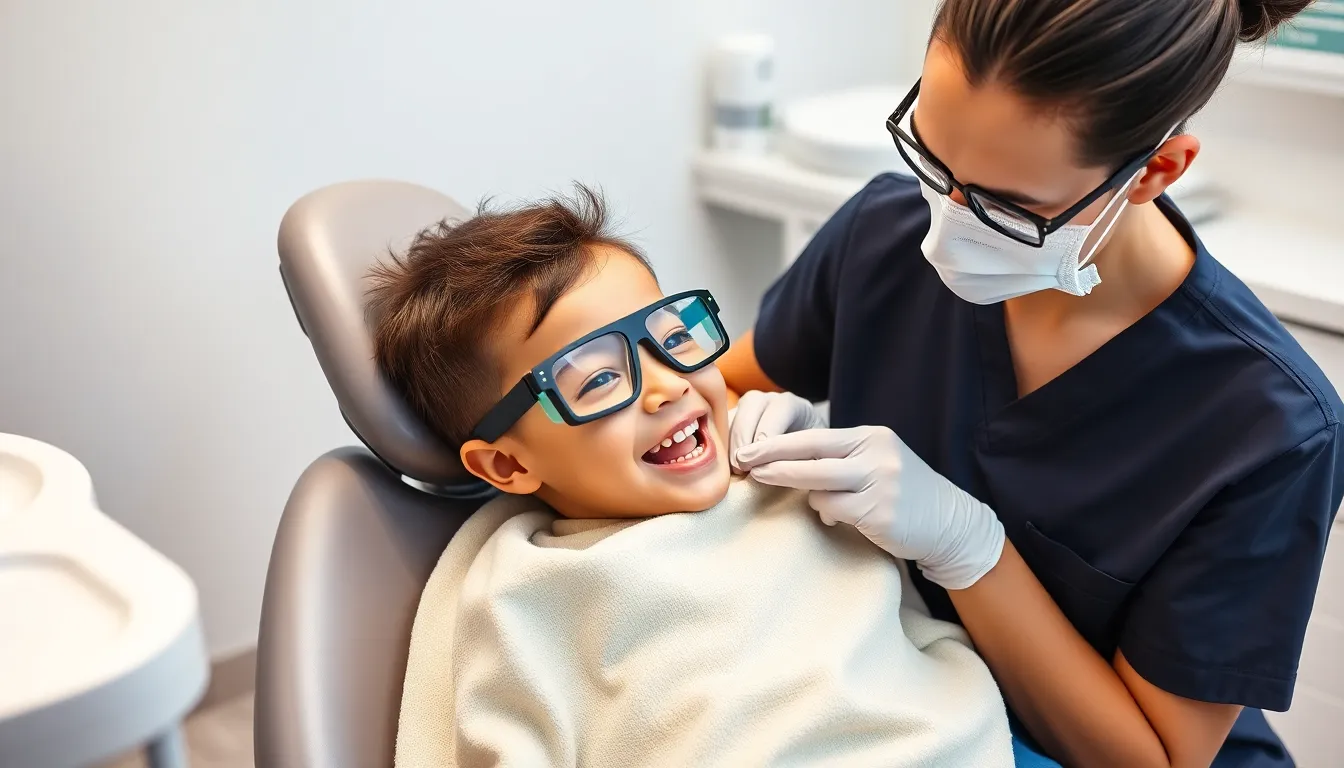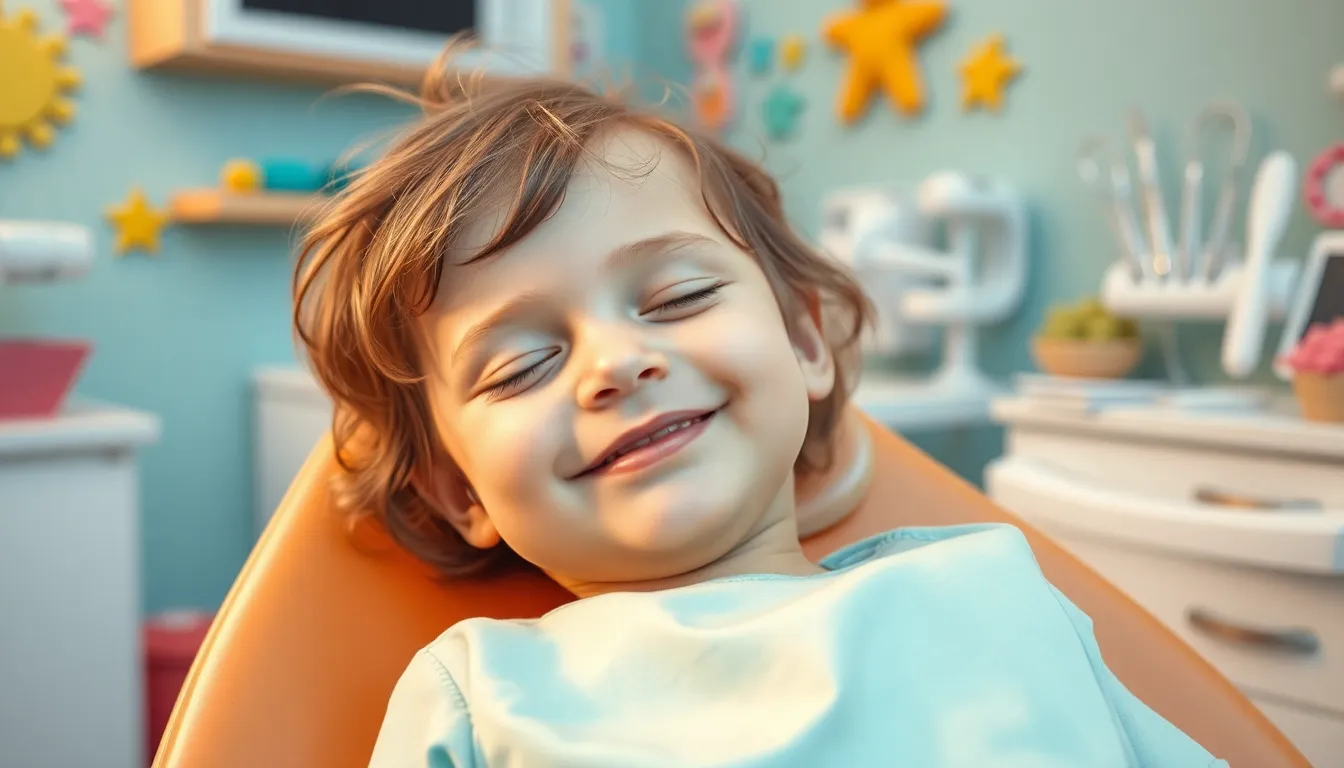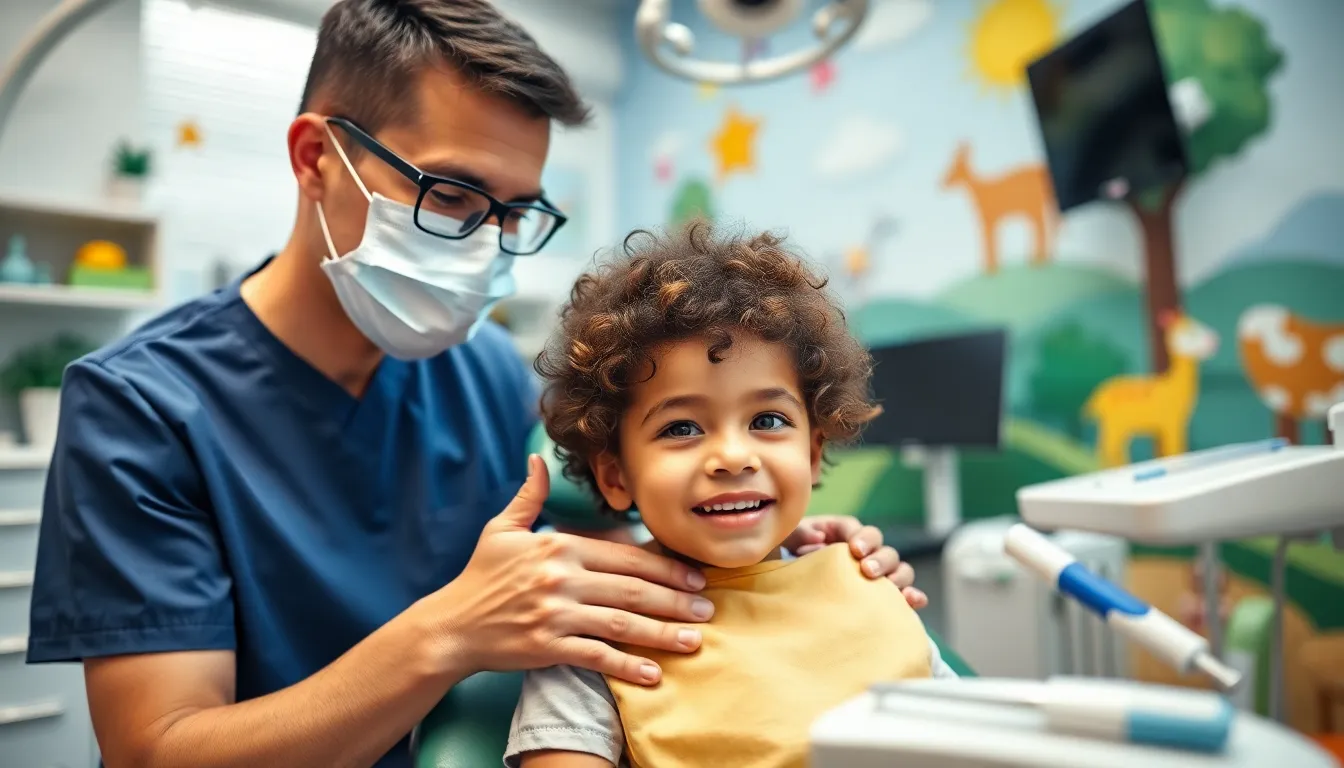Key Takeaways
- Sleep dentistry offers a gentle and effective solution for managing dental anxiety in children, allowing them to receive necessary care comfortably while asleep.
- Various sedation options, including nitrous oxide, oral sedation, and general anaesthesia, can be tailored to each child’s needs to ensure both safety and comfort during dental procedures.
- This approach not only reduces fear and stress but also helps prevent negative dental experiences, encouraging better long-term oral health habits and higher attendance rates for future appointments.
- Specialised paediatric dental teams in Brisbane prioritise safety by adhering to strict monitoring and sedation protocols, minimising potential risks and ensuring a smooth recovery for children.
- Sleep dentistry is especially beneficial for children with severe anxiety, sensory sensitivities, special needs, or those requiring complex dental treatments.
Dental visits can trigger anxiety in many children, with unfamiliar environments and procedures often causing distress. Sleep dentistry offers a gentle and effective solution, allowing children to receive necessary dental care while comfortably asleep. This approach not only alleviates fear but ensures treatments are completed safely and efficiently, supporting long-term oral health without the added emotional burden.
For parents seeking anxiety-free dental experiences for their children, sleep dentistry in Brisbane provides specialized care with various sedation options tailored to each child’s unique needs and comfort level.
Understanding Dental Anxiety in Children
Children experience dental anxiety frequently, especially in clinical settings with unfamiliar sounds, sights, and procedures. Data from the Australian Dental Association show that up to 1 in 5 children show signs of dental fear during routine visits. Triggers include noisy equipment, masks on clinicians, and uncertainty about procedures, which can result in crying, resistance, or refusal to enter treatment rooms.
Dental anxiety impacts care quality. Reluctance or inability to cooperate means essential treatments are delayed or abandoned, risking oral health. In some Brisbane clinics, specialists implement sleep dentistry to address this concern, reducing barriers to effective treatment.
Sleep dentistry in Brisbane uses sedation or general anaesthesia. These methods enable calm, safe treatment for anxious children or those with sensory sensitivities. Sedation options—like nitrous oxide, oral sedatives, or intravenous (IV) sedation—help children relax but stay conscious. General anaesthesia ensures complete sleep and is recommended for complex treatments or profound anxiety, particularly in clinics such as Sleep Dentistry Brisbane.
Families seek reassurance about safety and outcomes. Brisbane dental teams use contemporary monitoring equipment throughout sedation or anaesthesia. Paediatric-trained staff, as found in Sleep Dentistry Brisbane clinics, customise care to each child’s medical and emotional needs, ensuring comfort and minimising anxiety for future appointments.
What Is Children’s Sleep Dentistry?

Children’s sleep dentistry uses sedation to manage dental anxiety and discomfort during treatment. Sleep Dentistry Brisbane applies these methods to help anxious children relax or stay calm for safe dental procedures.
Types of Sedation Used
Sleep dentistry in Brisbane includes three main sedation types for children. Nitrous oxide, also called “happy gas”, provides mild, short-term relaxation, and lets children remain awake with reduced anxiety. Oral sedation relies on prescribed medication taken before treatment and creates a stronger calming effect than nitrous oxide; children stay drowsy but responsive. General anaesthesia delivers complete unconsciousness, used only in hospital settings for complex or extensive procedures. Sleep Dentistry Brisbane assesses anxiety level, treatment needs, and medical history to choose the safest sedation.
Safety and Effectiveness
Paediatric sleep dentistry in Brisbane demonstrates high safety and effectiveness under trained dental teams. Advanced monitoring equipment and paediatric anaesthetists supervise all procedures involving oral sedation and general anaesthesia. Dental anxiety minimises when children experience painless care—one Brisbane clinic reports reduced anxiety in over 85% of children after sleep dentistry. Efficient sedation allows dentists to complete more treatment in fewer sessions, benefiting both children and caregivers. Regulatory guidelines from the Dental Board of Australia ensure strict adherence to safety standards. Parents report higher satisfaction and improved follow-up attendance for ongoing dental care.
How Children’s Sleep Dentistry Helps Manage Dental Anxiety

Children’s sleep dentistry provides a predictable solution for dental anxiety by allowing treatment while children sleep, eliminating awareness of dental procedures. In Brisbane, clinics specialising in sleep dentistry deliver care through sedation and general anaesthesia, supporting children with acute fear, sensory challenges, or complex dental needs.
Reducing Fear and Stress in the Dental Chair
Sleep dentistry reduces fear and stress by keeping children unconscious during dental procedures, making them unaware of the environment, equipment, or pain. In Brisbane, general anaesthesia supports children with severe anxiety or special needs, preventing distress from unfamiliar sights or sounds. The method removes common triggers, such as the whir of handpieces or the presence of dental masks, allowing dental teams to complete care efficiently. According to Sleep Dentistry Brisbane’s case review, children receiving treatment under general anaesthesia show lower rates of emotional distress and resistance during appointments, with over 85% experiencing reduced anxiety at follow-up visits.
Creating a Positive Dental Experience
A positive dental experience forms when children have pain-free, stress-free visits under sleep dentistry. After appointments under general anaesthesia in Brisbane, children often remember little or nothing of the procedure, eliminating negative memories and reframing dental care as a neutral or positive event. This approach encourages regular attendance for future visits, improving cooperation and long-term oral health habits. Studies from dental anxiety clinics in Australia link sleep dentistry to fewer missed or cancelled appointments, with most parents reporting higher satisfaction and greater success in establishing oral health routines for their children after sedation-assisted treatments.
Benefits and Considerations for Parents
Sleep dentistry in Brisbane enables safe, stress-free dental care for anxious children. It manages dental fear, supports positive experiences and reduces disruptive behaviours during appointments.
Who Is a Good Candidate?
Candidates for sleep dentistry include children with severe dental anxiety who resist conventional treatment. Children in Brisbane with special needs, such as sensory sensitivities or ADHD, also benefit since sedation limits sudden movements and distress. Young children or those with developmental delays find sleep dentistry effective when they’re unable to understand instructions. The service suits complex dental cases, such as multiple fillings, as treatment can be completed efficiently in a single visit. Dental clinics in Brisbane individually assess each child’s suitability by reviewing their medical history, current health, and previous dental experiences.
Potential Risks and Precautions
Sleep dentistry maintains a strong safety profile in Brisbane when performed by trained professionals. Rare complications such as breathing problems or allergic reactions can occur but are minimised by a qualified paediatric anaesthetist present throughout the procedure. Temporary effects, like drowsiness or nausea, are common in the hours following sedation. Parents in Brisbane must follow pre-procedure fasting instructions and disclose all medications and health conditions. Dental teams use strict protocols, including continuous monitoring and emergency preparedness, to ensure patient safety at all times.
Choosing the Right Dental Team
Selecting a specialist team in Brisbane for children’s sleep dentistry ensures safe, anxiety-free treatment. Clinics like Sleep Dentistry Brisbane employ dentists and anaesthetists accredited in paediatric sedation and general anaesthesia according to Dental Board of Australia standards. Accredited teams possess certifications specific to child sedation protocols, supporting safe care throughout sedation-based dental procedures.
Child-focused dental clinics implement proven anxiety reduction methods, including pre-appointment consultations and sensory-friendly environments. Paediatric dentists trained in behavioural management handle anxious children and those with developmental differences like autism or ADHD, tailoring approaches to suit each child’s needs. Clinical settings prioritise distraction techniques, comfort objects and clear communication.
Strict safety protocols at reputable Brisbane clinics require continuous monitoring of oxygen levels, heart rate and blood pressure throughout sedation or general anaesthesia. Emergency response equipment remains ready, and staff regularly train for medical contingencies to manage rare complications. Recognised sleep dentistry services offer thorough consultation, clear guidance on pre- and post-treatment instructions and follow-up care.
Families choosing a dental provider benefit by reviewing experience in complex paediatric cases, evaluating parent reviews and confirming sedation staff credentials. Sleep Dentistry Brisbane stands out by meeting these criteria, providing a supportive, safe environment where dental fear does not disrupt necessary oral care for Brisbane’s children.
About Sleep Dentistry Brisbane
Sleep Dentistry Brisbane, located in Upper Mt Gravatt, QLD, provides a comprehensive range of dental services designed to be carried out under sedation to ensure a comfortable and stress-free experience. Owned by Ian Mason, the clinic offers services such as root canals, dental implants, and a variety of treatments for both adults and children. With several sedation options available—including general anaesthesia, intravenous (IV) sedation, and nitrous oxide (laughing gas)—Sleep Dentistry Brisbane prioritises patient comfort and care during procedures, ensuring a calm and relaxing environment.
Contact:
Ian Mason, Owner
Phone: (07) 3343 5006
Email: [email protected]
Address: 11/1932-1974 Logan Rd, Upper Mt Gravatt, QLD 4122
Website: www.sleepdentistrybrisbane.au
Frequently Asked Questions
What is children’s sleep dentistry?
Children’s sleep dentistry involves using sedation or general anaesthesia so that children can undergo dental treatment comfortably, often while asleep. This helps reduce anxiety and ensures safety and cooperation during dental procedures.
Who is a good candidate for sleep dentistry?
Sleep dentistry is well-suited for children with severe dental anxiety, sensory sensitivities, special needs, ADHD, young age, developmental delays, or those requiring complex dental procedures that may be difficult to complete when awake.
Is sleep dentistry safe for children?
Yes, children’s sleep dentistry is considered very safe when performed by trained professionals in accredited clinics. Dental teams continuously monitor children and follow strict protocols, significantly minimising risks such as breathing problems or allergic reactions.
What sedation methods are used in children’s sleep dentistry?
Common sedation options include nitrous oxide (laughing gas) for mild relaxation, oral sedation for a deeper calming effect, and general anaesthesia for more complex or anxious cases. The chosen method depends on each child’s needs and the procedure.
How does sleep dentistry help reduce dental anxiety?
Sleep dentistry allows children to receive treatment while relaxed or asleep, preventing exposure to anxiety triggers such as dental equipment noise and clinical masks. Most children remember little about the procedure, resulting in reduced fear at future visits.
Are there any risks or side effects with sleep dentistry?
Risks are rare but can include temporary drowsiness, nausea, breathing difficulties, or allergic reactions. These are minimised by experienced dental teams, careful monitoring, pre-procedure fasting, and clear communication about your child’s health and medications.
What should parents do to prepare their child for sleep dentistry?
Parents should follow all pre-procedure instructions, such as fasting before the appointment, and inform the dental team about any medical conditions or medications. Explaining the process simply and positively can also help reassure the child.
How can parents choose the right clinic for sleep dentistry in Brisbane?
Choose a clinic with accredited dentists and anaesthetists experienced in paediatric sedation, strong safety protocols, and a child-friendly environment. Look for positive reviews and ensure the team adheres to Australian Dental Board standards.
What are the benefits of sleep dentistry for parents and children?
Sleep dentistry ensures dental care is stress-free for anxious children, allows multiple treatments in one visit, and promotes positive dental experiences. This leads to fewer missed appointments and helps establish healthy, lifelong oral care habits.
How soon can my child resume normal activities after sleep dentistry?
Most children recover within a few hours, although some may feel drowsy or experience mild nausea temporarily. Your dental team will provide specific aftercare instructions. Always monitor your child after the procedure and contact the clinic if you have concerns.
